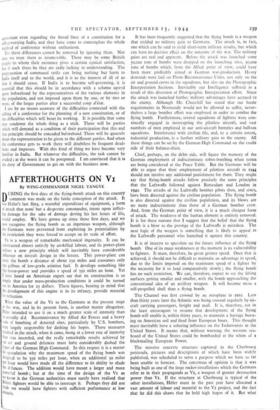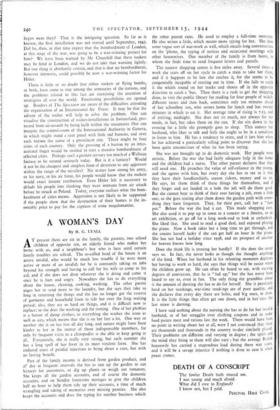AFTERTHOUGHTS ON Vi
By WING-COMMANDER NIGEL TANGYE
DURING the first days of the flying-bomb attack on this country comment was made on the futile conception of the attack. It was Hitler's last fling, a wasteful expenditure of equipment, a form of attack that none but a desperate commander, intent upon inflict- ing damage for the sake of damage during his last hours of life, would employ. We have grown up since those first days, and we now recognise the flying bomb as an ingenious weapon, although the Germans were prevented from exploiting its potentialities by the restriction they were forced to accept on its scale of effort.
VI is a weapon of remarkable mechanical ingenuity. It can be constructed almost entirely by unskilled labour, and its power-plant utilises a new principle which will inevitably have considerable influence on aircraft design in the future. This power-plant can carry the bomb a distance of about 15o miles and consumes only 13o gallons of low-grade aviation fuel. It develops something like 700 horse-power and provides a speed of 35o miles an hour. Yet I have heard an American expert say that its construction is so simple that under mass-production conditions it could be turned out in America for 25 dollars. These figures, bearing in mind that the development of this engine is in its infancy, provide material for reflection.
What the value of the Vi to the Germans at the present stage of the war, and in its present form, is another matter altogether. Hitler intended to use it on a much greater scale of intensity than he actually did. Reconnaissance by Allied Air Forces and a heavy scale of bombing of detected sites, particularly by U.S. bombers, were largely responsible for` dashing his hopes. These measures resulted in,the attack, when it came, being at a lower rate of intensity than was intended, and the really remarkable results achieved by our air and ground defences must haVe considerably dashed the hopes of the German High Command. In this respect it is a matter for speculation why the maximum speed of the flying bomb was designed to be 35o miles per hour, when an additional 5o miles Per hour would have made all the difference to its ability to elude the defences. The addition would have meant a larger and more Powerful bomb ; but at the time of the design of the Vi as we know it the German authorities must surely have realised that British fighters would be able to intercept it. Perhaps they did not ink we would have fighters with sufficient performance at low It has been frequently suggested that the flying bomb is a weapon that yielded no military gain to Germany. The attack is, in fact, one which can be said to yield short-term military results, but which can have no decisive effect on the outcome of the war. The military gains are real and apparent. Before the attack was launched some 50,000 tons of bombs were dropped on the launching sites, 50,000 tons of bombs which, from the Allied point of view, could have been more profitably aimed at German war-production. Heavy demands were laid on Photo Reconnaissance Units, not only on the air and ground crews in the squadrons, but also on the Photographic Interpretation Sections. Inevitably our Intelligence suffered as a result of this diversion of Photographic Interpretation effort. Since the attack was launched further military advantages have accrued to the enemy. Although Mr. Churchill has stated that our battle requirements in Normandy would not be allowed to suffer, never- theless a large bomber effort was employed in order to combat the flying bomb. Furthermore, several squadrons of fighters were con- tinually engaged in intercepting the pilotless aircraft, and vast numbers of men employed in our anti-aircraft batteries and balloon squadrons. Interference with civilian life, and, to a certain extent, industrial production, is a further military gain to the enemy. All these things can be set by the German High Command on the credit side of their balance-sheet.
Chief, perhaps, on the debit side, will figure the memory of the German employment of indiscriminate robot-bombing when terms are being considered at the Peace Table. But the Germans will be able to argue that their employment of pilotless aircraft in 1944 should not involve any additional punishment for them. They might say that flying-bomb attacks follow precisely the same principles that the Luftwaffe followed against Rotterdam and London in 194o. The attacks of the Luftwaffe bomber pilots then, and since, have been directed against the civilian population. The flying bomb is also directed against the civilian population, and its blows are no more indiscriminate than those of a German bomber crew. And, from the German point of view, it is a much cheaper form of attack. The weakness of the human element is entirely removed. It is for these reasons that I suggest that the belief that the flying bomb is a blow to the prestige of the Luftwaffe is mistaken. The neat logic of the weapon is something that is likely to appeal to the Luftwaffe personnel who launched it against this country.
It is of interest to speculate on the future influence of the flying bomb. One of its main weaknesses at the moment is its vulnerability to fighters. It must, therefore, be given greater speed. Once that is achieved, it should not be difficult to maintain an advantage in speed, due to the limits imposed on the maximum speed of a fighter by the necessity for it to land comparatively slowly ; the flying bomb has no such restriction. We can, therefore, expect to see the lifting surfaces getting smaller and smaller, with the bomb approaching the conventional idea of an artillery weapon. It will become more a self-propelled shell than a flying bomb.
The Channel was first crossed by an aeroplane in 1910. Less than thirty years later the Atlantic was being crossed regularly by air- craft carrying passengers, freight and mail. It is, therefore, not in the least extravagant to assume that development of the flying bomb will enable it, within thirty years, to maintain a barrage burst- ing on American soil and fired from European bases. This thought must inevitably have a sobering influence on the Isolationists in the United States. It means that, without warning, the western sea- board of the United States could be bombarded at the whim of a blackmailing European Power.
The massive concrete structure captured in the Cherbourg peninsula, pictures and descriptions of which have been widely published, was scheduled to serve a purpose which we have so far been unable to forecast. The consensus of opinion is that it was being built as one of the large rocket-installations which the Germans refer to in their propaganda as V2, a weapon of greater destructive power than V1. If the structure at Cherbourg is typical of the other installations, Hitler must in the past year have allocated a vast amount of labour and material to the V2 project, and the fact that he did this shows that he held high hopes of it. But what hopes were they? That is the intriguing question. So far as is known, the first installation was not started until September, 1943. Did he, then, at that time expect that the bombardment of London, at this stage of the war, was going to be a war-winning project for him? We have been warned by Mr Churchill that these rockets may be fired at London, and we do not take that warning lightly. But one thing is absolutely certain, and that is that no bombardment, however intensive, could possibly be now a war-winning factor for Hitler.
There is little or no doubt that either rockets or flying bombs, or both, have come to stay among the armouries of the nations, and the problems related to this fact are exercising the attention of strategists all over the world. Fascinating possibilities are opened up. Readers of The Spectator are aware of the difficulties attending the organisation of an International Air Force. It may be that the advent of the rocket will help to solve the problem. One can visualise the construction of rocket-installations in Switzerland, pro- tected from air-assault by being built within the mountains. One can imagine the control-room of the International Authority in Geneva, in which might stand a neat panel with little red buttons, and over each butten the name of a prominent city. There might be four cities of each country. Only the pressing of a button by an inter- national finger would be needed to start a massive bombardment of selected cities. Perhaps such a picture savours too much of a Wellsian fantasy to be treated seriously today. But is it a fantasy? Would it not be the cheapest and simplest form of deterrent to any aggressor within the range of the missiles? No matter how strong his army, or his navy, or his air force, his people would know that the rockets would exact instant retribution. Even Hitler felt it necessary to delude his people into thinking they were immune from air attack before he struck at Poland. Today, everyone realises what the bom- bardment of cities means. Aggression is not likely to be supported if the people show that the destruction of their homes is the in- evitable price to pay for the caprices of some megalomaniac.























 Previous page
Previous page